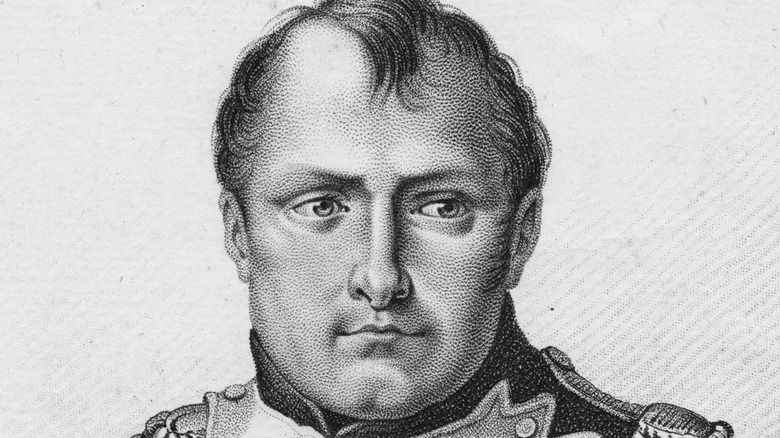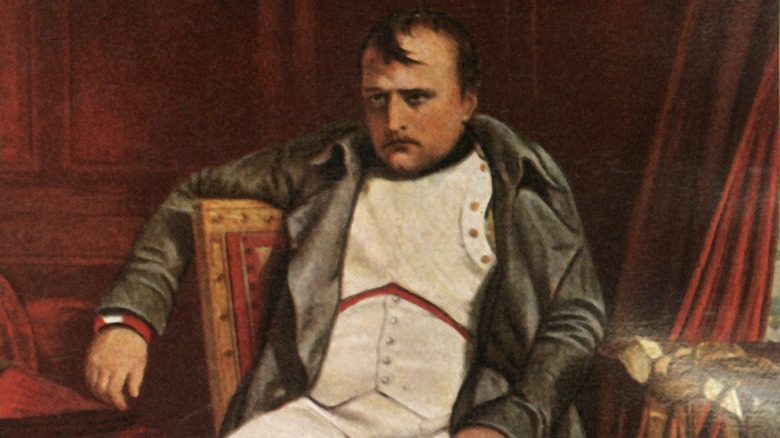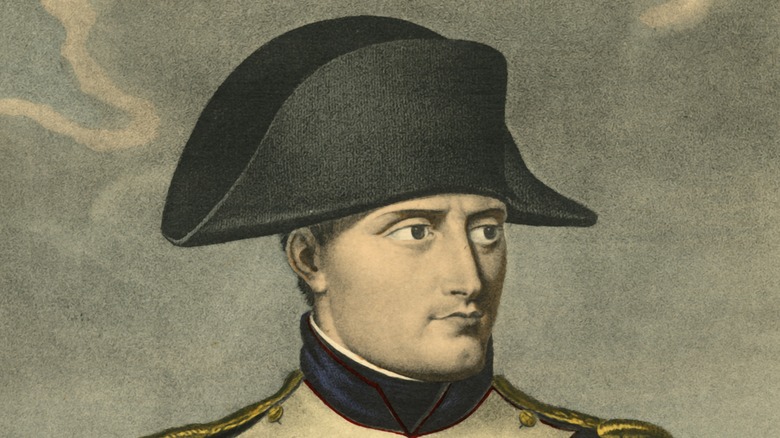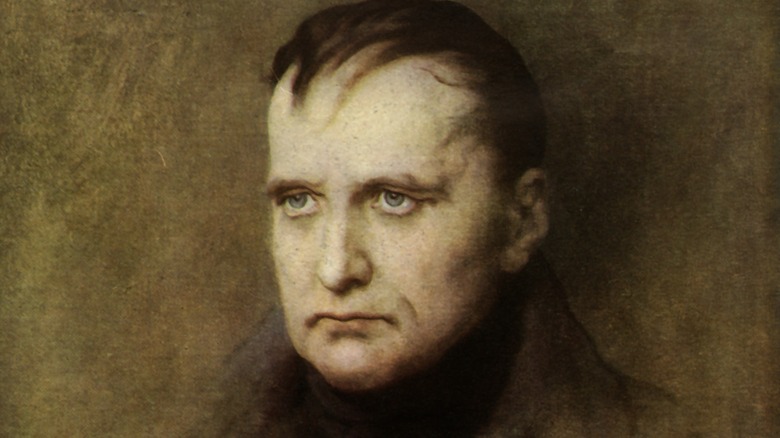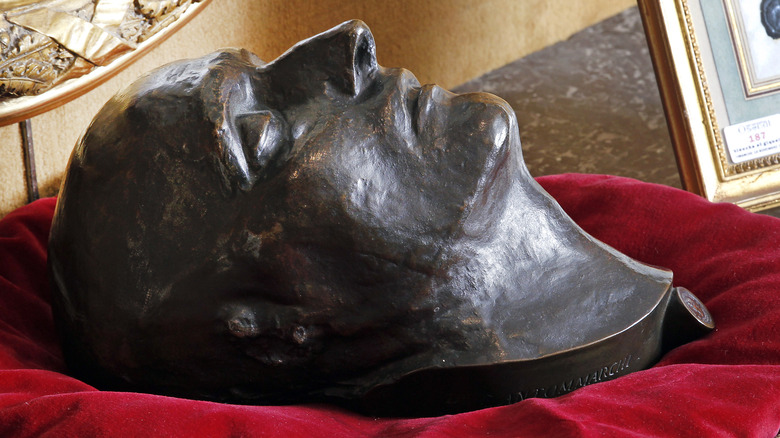What The Final Months Of Napoleon's Life Were Like
From the time that Napoleon Bonaparte died in 1821, rumors were rampant that the twice-abdicated Emperor of France was poisoned. Such claims of foul play persisted until recently, when modern medical experts determined the military leader's true cause of death. To reach these conclusions investigators looked at medical notes from the doctors attending to Napoleon at the time he died, as well as his autopsy records. Thanks to that research, theories that Napoleon was murdered have been put to rest. That, combined with what's already known about Napoleon's behavior and symptoms in advance of his death, also offer a fascinating look at what Napoleon's life was like in his final few months (via National Geographic).
When he died, Napoleon — also known as Napoleon I — a Corsican native, had twice been the emperor of France. In that time, Napoleon had nearly conquered all of Europe. Thanks to a string of terrible defeats at the hands of the Russians (the cause of his first abdication) as well as his grandest failure, The Battle of Waterloo in 1815, Napoleon had fallen out of favor with French aristocracy. It was then that Napoleon was forced to abdicate once more. After nearly escaping to the U.S., Napoleon was sent into exile on the remote island of St Helena. It's on this tiny island in the South Atlantic where Napoleon would live out his remaining days, per Britannica.
An emperor in exile
When Napoleon was exiled the first time it was to Elba, a small island in the Tuscan Archipelago (via Discover Tuscany). As part of the Treaty of Fontainebleau, Napoleon was allowed to keep the title of emperor, and given a sizable annual income of two million francs. Hundreds of guards were also allowed to attend to him, and he was given absolute rule over the island to which he was exiled. Even in exile, the disgraced Napoleon would live in luxury, as Britannica explains. None of this stopped an attempt on Napoleon's life during the harrowing passage to Elba from France, though.
Soon enough, Napoleon returned to power in France, but for just a brief time before his defeat at Waterloo. Following that infamous battle, Napoleon nearly escaped to America. In an effort to prevent Napoleon from trying to seize power again, the island of Elba was deemed to be too close to the European mainland, and Napoleon was instead sent to a remote island in the South Atlantic called St. Helena. Several of Napoleon's companions accompanied him into this second exile. At first, his life on the island was somewhat serene. Napoleon ate well, slept late, played cards, and read books in both French and English. But only a few months after he arrived, Napoleon began complaining of health problems.
Napoleon's health quickly declined
Only a short time after he arrived on St. Helena, Napoleon, then 46, reported similar symptoms to the condition that would one day kill him. As his mood worsened, Napoleon's body began to be wracked with aches and pains. Sometimes he was unable to sleep, and other times the former French emperor was unable to stay awake, with headaches and intestinal issues, including both diarrhea and constipation furthering his misery. Other symptoms Napoleon suffered included dehydration, hearing issues, tooth pain, and sores on Napoleon's mouth and lips. He also became jaundiced and was known to spasm, losing consciousness at several points, as Dartmouth Medicine explains.
During a particularly bad bout of illness in 1817 lasting a year, doctors were brought in to attend the sick exiled leader. What was wrong with Napoleon remained unclear. Signs of illness would come and go. One Irish doctor named Barry O'Meara was at Napoleon's side throughout the episode, having been on the British ship he surrendered to in 1815. He recorded the following: vomiting, soreness in his liver and along the right side of his abdomen, a lack of appetite, and fever. Even though Napoleon's health improved in the meantime, by 1819 his symptoms returned and, losing consciousness, it was believed that he could be close to dying. In retrospect, all his symptoms could add up to poisoning. There was certainly ample motive for world governments to conspire to do so (Via National Geographic).
There was one final period of recovery
Even after the low point of Napoleon's malady in 1817, he would seem to recover one final time, adding yet another layer of mystery to his health condition. In 1819, Napoleon was well enough to rise early and work until mid-morning. There were several ongoing projects on his estate. Despite periodic setbacks, this good health would remain for more than a year, though this turn of good luck for Napoleon would not last long. By 1820, the worst of his symptoms returned and he once more was under medical care with his daily activities highly restricted, according to Dartmouth Medicine.
By March of 1821, Napoleon suffered a severe relapse. By the first of May that year, he'd grown weak and almost completely lost his hearing. He vomited, hiccuped, and became incoherent in his speech, among other symptoms. By May 4, Napoleon lost consciousness one final time and later died.
At first, some medical professionals believed the exiled emperor's cause of death could be chronic hepatitis, or a possible stomach ulcer. An autopsy revealed a lesion, fluid, and scarring in Napoleon's lungs. His spleen and liver were also swollen. A large mass and lesion were also detected. Nevertheless, and even though rumors of poisoning remained, Napoleon's death was deemed at the time to be caused by a stomach ulcer (via National Geographic).
There was some evidence of poisoning
Adding fuel to the theory that Napoleon may have been poisoned by his political enemies were high levels of arsenic found in his hair. With arsenic more widely used in all sorts of products at that time, some level of arsenic detected in an autopsy was not uncommon. Otherwise, there was no other real evidence of poisoning recorded in Napoleon's autopsy, such as heart hemorrhaging. Combining modern medicine with notes and other period evidence, a study from an international team of researchers has now concluded that Napoleon died from gastric cancer.
Supporting this theory is the mass that was found in his stomach at the time of his autopsy, as well as rapid weight loss, and a grainy substance caused in his stomach by bleeding. Referring to the likely cancerous growth in Napoleon's stomach, a pathology and internal medicine professor from the University of Texas, Robert Genta said (via National Geographic) "It was a huge mass from the entrance of his stomach to the exit. It was at least [four inches] long. Size alone suggests the lesion was cancer." With that, the mystery of what killed Napoleon was answered, and conspiracy theories that Napoleon may have been poisoned seem to be put to rest.
Questions remain
Despite the verdict recently reached on what killed Napoleon Bonaparte, some questions remain such as what caused it, and whether or not his father and sister, who suffered a similar plight, may have also succumbed to the same condition. These final questions may never be answered, according to Genta. Napoleon's poor diet likely didn't help any potential genetic predisposition toward cancer, and even if Napoleon had not been in exile his ultimate fate was likely unavoidable. Similarly, it's highly unlikely, given his condition, that he could have returned to power for long even if he had tried.
Via National Geographic, Genta said, "[H]is terminal condition would have prevented him from playing a further major role in the theater of European history ... Even if treated today, he'd have been dead within a year." Following Napoleon's death, he was at first buried at a place called Sane Valley on St. Helena. Eventually, the French were allowed to return Napoleon Bonaparte to his homeland, where he currently rests on the grounds of Les Invalides, a complex of historic structures in Paris. His empty tomb remains on St. Helena, though, and it can still be visited today.
